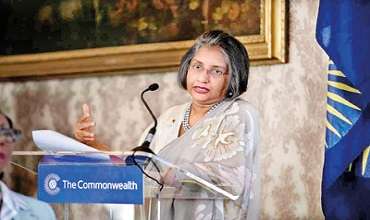Feature - Motivational strategies for challenging times
By Timothy A. Edward
Almost two months have swiftly passed in 2024, and in today's business world, motivation has become a key differentiating factor for both individuals and organisations to thrive and perform at their best. There are five time-tested principles of motivation that can help us to stay on track and thrive in the business world.
1. Establish high standards of performance
When organisation set high standards of performance, they tend to stand out. But these high standards can only be achieved if individuals are motivated to excel. When individuals have a clear target to work towards, they are more likely to put in their best efforts. This is evident in Google, which is widely known for setting high standards for its employees. The company's 'Objectives and Key Results' (OKR) system sets ambitious goals for employees, and the results have been remarkable. Google's revenue has doubled since implementing this system, and its employees are highly motivated to achieve their goals.
In Sri Lanka, some leading blue chip companies have been recognised by Great Places to Work, for establishing high standards of performance through their emphasis on employee development and training programmes. They also have a culture of recognising and rewarding high performers, motivating employees to excel.
2. Have an attitude that everyone's work is important
In a highly competitive and fast-paced business environment, it is easy to overlook the contributions of certain individuals or departments that bring into the organisation day in and day out. For example, the finance, support services and human resources departments. However, it is essential to recognise and appreciate the efforts of everyone in the organisation. This not only boosts morale but also creates a sense of belonging and motivation for employees. One company that does this exceptionally well is Zappos, an online shoe and clothing retailer. Zappos has a unique culture where everyone's work is valued and appreciated, regardless of their role in the company. This has helped them build a highly motivated and engaged workforce, resulting in excellent customer service and high levels of customer satisfaction.
At home, we can see some primer garment manufacturers constantly sending the message out through their advertisements that everyone's work is important. They have a strong culture of inclusivity and teamwork, where every employee is valued, and their contributions are recognised. This creates a sense of belonging and motivation among employees.
3. Convey trust in people's competences to do their jobs well
It is important that we convey trust in people's competencies to do their jobs well. Have a culture of empowering employees and giving them autonomy in their roles, and this will lead to a sense of ownership and motivation among employees.
A company that has successfully implemented this principle in the world is Southwest Airlines. The company's founder, Herb Kelleher, believed in his employees' abilities and trusted them to make decisions that would benefit the company. This created a culture of empowerment and motivation, resulting in Southwest becoming one of the most successful airlines in the world.
4. Inspire people to excel
In today's business world, it is not enough to just have a job and a good salary; individuals want to feel inspired and motivated to excel in their careers. This requires leaders to communicate a compelling vision and create a sense of purpose for their employees. One company that has done this remarkably well is Apple. Steve Jobs, the co-founder of Apple, was known for his ability to inspire and motivate his employees to create innovative products. He had a clear vision for the company, and his passion and enthusiasm were contagious, inspiring employees to excel and push the boundaries of what was possible.
Create a culture that recognises and inspires people to excel. Foster a culture of continuous learning and growth, providing opportunities for employees to develop their skills and reach their full potential. This motivates employees to perform at their best.
5. Create an enjoyable work environment
With the rise of remote flexible work styles and a more diverse workforce, organisations are taking steps to focus on creating an enjoyable work environment that caters to the needs and preferences of all employees. A positive work environment can significantly impact employee motivation and performance. A great example of this is Walt Disney World. The company is known for its fun and magical work environment, which has helped them attract and retain top talent. Disney's employees are motivated to create magical experiences for their guests because they themselves are part of an enjoyable work culture.
Here at home, we can especially see the ICT companies creating enjoyable work zones. They have a strong focus on employee engagement and well-being, with initiatives such as flexible working hours, team-building activities, and a fun and supportive work culture. Their offices embody a relaxing atmosphere that creates a positive and motivating work environment for employees.
Individualise your approach to motivation
While the above principles are essential for motivating employees, it is crucial to understand that every individual is unique and may require different approaches to stay motivated. This can include understanding employees' personal goals, life situations and providing opportunities for growth and development that align with their interests and strengths. For example, Google allows its employees to spend 20 per cent of their workweek on projects outside their job description, which has resulted in numerous successful products and a highly motivated workforce.
Walt Disney once said, 'All our dreams can come true if we have the courage to pursue them.' This quote perfectly encapsulates the spirit of motivation and perseverance. By establishing high standards of performance, valuing everyone's work, trusting employees' competencies, inspiring people to excel, and creating an enjoyable work environment, leaders can motivate their employees to perform at their best. And by individualising their approach to motivation, leaders can cater to the unique needs of their employees and create a highly motivated and engaged workforce.
-
Still No Comments Posted.

















Leave Comments